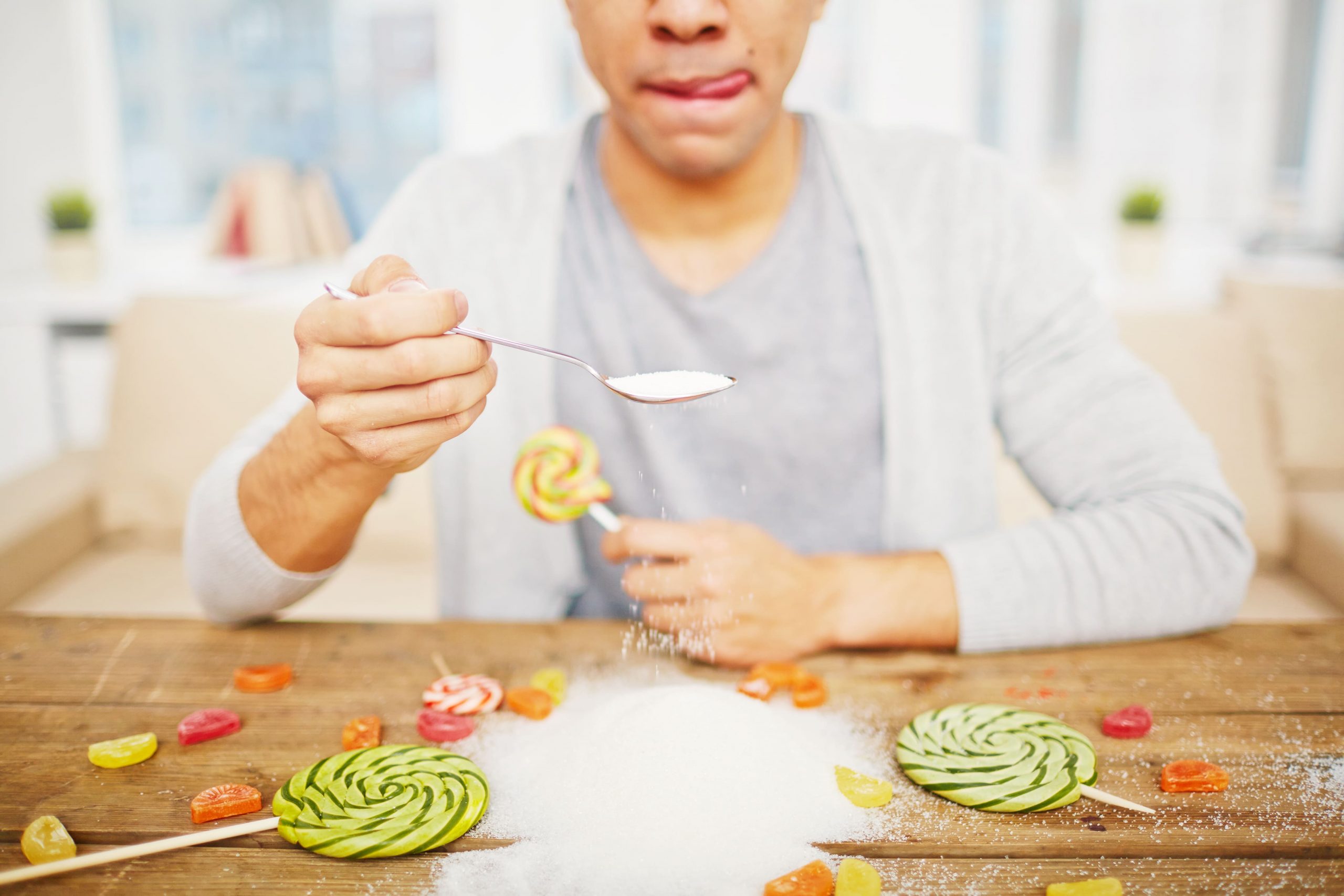
By Dr. Mercola,
STORY AT-A-GLANCE
- Sugar is one of the most harmful and addictive substances that you can consume. Excessive sugar consumption is associated with chronic metabolic problems, such as Type 2 diabetes, obesity and heart disease
- When you eat sugary foods, the reward center of your brain, known as the nucleus accumbens, is stimulated through increased signals of dopamine
- As you consume excessive amounts of sugar on a regular basis, your body’s dopamine signals become weaker, causing you to develop tolerance and eventually addiction
Sugar is one of the most harmful and addictive substances that you can consume, as it’s associated with various metabolic diseases.1 Nowadays, it’s found in almost everything you eat.
In fact, the average American consumes around 17.4 teaspoons of sugar per day — that’s more than 5 teaspoons higher than the average sugar intake recommended by the U.S. Dietary Guidelines for Americans, 2015-2020.2 A 2015 article from The Washington Post states that the U.S. even ranks first in the countries that consume the highest amount of sugar.3
According to a study published in the Journal of the Academy of Nutrition and Dietetics, around 75% of packaged foods sold in supermarkets contain added sugar. This includes processed foods like sweet snacks, cereals, energy drinks, fruit juices and baked goods. It’s even present in infant food and baby formula, exposing children to numerous health issues at a very young age.4
But avoiding sugar is not as simple as skipping sweet foods, as savory foods, like salad dressing and pizza, contain this ingredient as well. Sugar hides behind 61 different names in food labels, the most common of which include sucrose, high-fructose corn syrup, molasses, maple syrup, glucose, maltose, lactose and fruit juice concentrate, among others.5,6
What makes sugar so addicting?
When you eat sugary foods, the reward center of your brain, known as the nucleus accumbens, is stimulated through increased signals of dopamine, a neurotransmitter that plays a role in your perception of pleasure.7
Because eating sugar makes you feel good, you’re likely to eat it often. As you consume excessive amounts of sugar on a regular basis, your body’s dopamine signals become weaker and you develop tolerance, so you have to eat more sugar to get the same level of reward, eventually resulting in sugar addiction. This is why manufacturers use sugar to drive your behavior.8
There have been many studies regarding the addictive potential of sugar.9,10 For instance, a 2018 review published in the British Journal of Sports Medicine states that “sugar has been found to produce more symptoms than is required to be considered an addictive substance.”
It exhibits drug-like effects such as bingeing, craving, tolerance, withdrawal, cross-sensitization, cross-tolerance and cross-dependence.11 Another study published in the journal Neuroscience states that intermittent bingeing on sucrose and abusing drugs can both increase extracellular dopamine in the nucleus accumbens.12
60 ways sugar can ruin your health
Excessive sugar consumption is associated with chronic metabolic problems, such as Type 2 diabetes, obesity and heart disease.13 Aside from these, there have been numerous studies spanning decades that demonstrate the other ways in which eating too much sugar can lead to detrimental effects to your health. I counted 60 of these health risks, divided into four categories:
Nutrient imbalance or deficiency
- Upsets the mineral relationships in your body14
- Causes chromium deficiency15
- Interferes with the absorption of calcium and magnesium16
- Increases total cholesterol, triglycerides and bad cholesterol levels17
- Decreases good cholesterol levels18
- Lowers vitamin E levels19
Behavioral changes
- Leads to addiction and intoxication, similar to alcohol20,21
- Increases hyperactivity22 and depressive symptoms23
- Causes difficulty in concentrating and drowsiness24
- Reduces learning capacity and can cause learning disorders25
- Increases the risk for antisocial behavior26
- Decreases emotional stability27
- Increases the risk for alcoholism28
Increased risk of diseases
- Promotes cancer cell growth29
- Increases fasting levels of glucose30,31
- Increases blood pressure levels32
- increases platelet adhesion, which could put you at risk of arterial thrombotic conditions33
- Leads to formation of kidney stones and gallstones34,35
- Promotes excessive food intake through rapid sugar absorption36
- Increases the risk for obesity37
- Decreases insulin sensitivity, leading to high insulin levels and eventually diabetes38
- Causes reactive hypoglycemia39
- Triggers dizziness40 and headaches, including migraines41
- Makes you more prone to gastrointestinal tract problems42
- Promotes chronic degenerative diseases43
- Causes atherosclerosis and cardiovascular diseases44
- Causes cataracts and nearsightedness45
- May lead to autoimmune diseases like arthritis, asthma and multiple sclerosis46
- Increases the risk for lung cancer47
- Contributes to osteoporosis48
- Promotes the progression of Parkinson’s disease49
- Increases the risk of gout and Alzheimer’s disease50,51
- Increases acidity of the saliva and causes tooth decay and periodontal diseases52,53
- Promotes uncontrolled growth of Candida Albicans (yeast infection)54
- Leads to toxemia in pregnancy55
- Worsens symptoms of children with attention deficit hyperactivity disorder (ADHD)56
- May lead to epileptic seizures57
Bodily impairments
- Impairs metabolic processes in a normal healthy individual58
- Suppresses the immune system, which increases risk of contracting infectious diseases59
- Reduces tissue elasticity and function60
- Leads to weaker eyesight61
- Accelerate aging62
- Increases advanced glycation end products wherein sugar molecules attach to proteins and end up damaging them63
- Impairs DNA and collagen structure64
- Alters collagen structure65
- Worsens signs of skin aging66
- Lowers the ability of your enzymes to function67
- Promotes fat accumulation in the liver68
- Increases the risk for kidney and pancreatic damage69,70
- Contributes to salt and fluid retention71
- Affects urinary electrolyte composition72
- Impairs normal function of the adrenal glands73
- Compromises lining of capillaries74
- Weakens your tendons75
- Can cause an increase in delta, alpha and theta brain waves, which results in the inability to think clearly76
- Causes hormonal imbalances77,78
- Increases free radicals and oxidative stress79
- Leads to substantial decrease in gestation, with a twofold increased risk for delivering a small-for-gestational-age infant80
- Causes dehydration among newborns81
- Affects carbon dioxide production when given to infants82
How to manage sugar addiction
It’s never too late to kick your sugar-loading habits to the curb. Here are some of my recommendations to help manage or limit your sugar consumption:
1.Limit your sugar intake — Sugar in its natural form is not bad provided that it’s consumed in moderation. Generally, your total sugar consumption should be below 25 grams per day from all sources, including sugar that you get from whole fruits. However, if you have insulin or leptin resistance, it’s ideal to limit your fructose intake to as little as 15 grams per day until you’ve normalized your insulin and leptin levels.
2.Avoid high-fructose corn syrup (HFCS) — This sweetener is made from corn and found in many of the food items that you eat and drink today. It’s considered to be dangerous not only because of the amount of sugar that it contains, but also because of the health risks that it can cause, most of which are mentioned above.83
3.Increase your consumption of healthy fats — Healthy fats, such as omega-3 fatty acids, saturated fats and monounsaturated fats, are your body’s preferred source of fuel. The best sources of these include grass fed butter, coconut oil, free-range eggs, wild-caught Alaskan salmon, avocado and raw nuts like pecans and macadamia.
4.Add fermented foods into your diet — Eating fermented foods like kimchi, natto, organic yogurt and kefir may help reduce the negative effects of excessive sugar on your liver by supporting your digestive function and detoxification.
5.Drink pure water — Instead of drinking sweetened beverages like soda and fruit juices, I recommend that you rehydrate your body with pure, clean water.
6.Try the Emotional Freedom Techniques (EFT) — Food cravings are sometimes triggered by an emotional need, such as wanting to relieve stress or feel a little happier after a tiring day.84 EFT is a simple and effective psychological acupressure technique that could help you manage the emotional components of your cravings.
It has been proven to help relieve emotional traumas, ease phobias and post-traumatic stresses, break down food cravings and lessen physical pain and discomfort. What EFT entails in its practitioners is to have the right mindset when going on a diet or just taking steps to improve on their health. If you’re already curious, you can browse through the basics of EFT here.
Aside from the recommendations mentioned above, I recommend exercising every day, along with optimizing your vitamin D levels, getting enough sleep and managing your stress levels. These strategies may help minimize the effects of excessive sugar intake. Exercise in particular is known to improve insulin sensitivity,85 reduce stress levels,86 suppress ghrelin (the appetite hormone),87 speed up metabolism,88 strengthen bones89 and boost your mood.90
It can be quite difficult to say no to sweets, especially if you have been consuming them on a daily basis, but once you feel the effects that lowering your sugar intake has on your body, it will all be worth it.
Source: https://articles.mercola.com
Disclaimer: We at Prepare for Change (PFC) bring you information that is not offered by the mainstream news, and therefore may seem controversial. The opinions, views, statements, and/or information we present are not necessarily promoted, endorsed, espoused, or agreed to by Prepare for Change, its leadership Council, members, those who work with PFC, or those who read its content. However, they are hopefully provocative. Please use discernment! Use logical thinking, your own intuition and your own connection with Source, Spirit and Natural Laws to help you determine what is true and what is not. By sharing information and seeding dialogue, it is our goal to raise consciousness and awareness of higher truths to free us from enslavement of the matrix in this material realm.
 EN
EN FR
FR


























